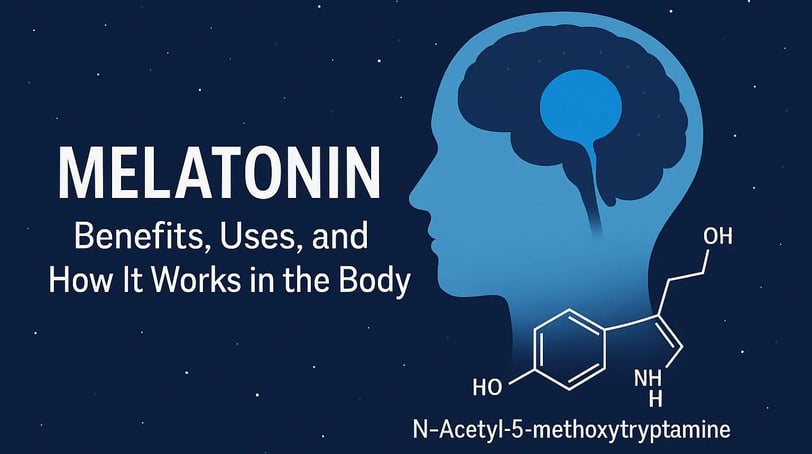What is Melatonin? Benefits, Uses, and How It Works in the Body
What is melatonin? Discover how this natural hormone regulates your sleep-wake cycle, boosts mood, supports immune health, and improves overall well-being..


Introduction: What is Melatonin?
Melatonin is a naturally occurring hormone that plays a vital role in regulating sleep-wake cycles and maintaining the body’s internal clock, known as the circadian rhythm. It is produced primarily by the pineal gland in the brain, especially in response to darkness. As night approaches, melatonin levels rise, signaling the body to prepare for sleep.
Melatonin is synthesized from the amino acid tryptophan and is scientifically known as N-acetyl-5-methoxytryptamine. Aside from managing sleep patterns, it supports immune health, mood balance, and body temperature regulation. Its ability to promote relaxation and decrease alertness makes it essential for healthy sleep.
How Melatonin Works in the Body
Melatonin production is controlled by the brain’s suprachiasmatic nucleus (SCN)—the master body clock located in the hypothalamus. Light exposure, especially through the eyes, influences melatonin production. When it’s dark, the SCN signals the pineal gland to secrete melatonin, while exposure to light suppresses it.
This hormone interacts with neurotransmitters and other biological systems:
Suppresses cortisol: Reduces stress hormone levels at night for better sleep.
Boosts GABA activity: Enhances calming signals in the brain, aiding sleep onset.
Lowers body temperature: Helps initiate and maintain restful sleep.
Maintaining a regular sleep schedule and minimizing exposure to blue light (from phones or computers) in the evening can enhance natural melatonin production.
Benefits and Uses of Melatonin
Melatonin offers several health benefits beyond sleep regulation:
1. Improves Insomnia and Sleep Disorders
Melatonin supplements are commonly used to treat insomnia and delayed sleep phase disorder. It helps people fall asleep faster, stay asleep longer, and experience deeper sleep.
2. Reduces Jet Lag
Traveling across time zones can disrupt your circadian rhythm. Melatonin helps re-align the body’s internal clock, easing symptoms of jet lag, such as fatigue and sleep disruption.
3. Supports Shift Workers
People who work night or rotating shifts often experience sleep disturbances. Melatonin can aid in adjusting their sleep-wake cycles and improving overall sleep quality.
4. Eases Seasonal Affective Disorder (SAD)
During darker months, melatonin imbalance may contribute to SAD, a type of depression. Supplementation may help regulate mood and improve sleep patterns.
5. Acts as an Antioxidant
Emerging research suggests melatonin may combat oxidative stress, offering potential protection against aging and chronic diseases.
Melatonin Dosage and Forms
Melatonin is available in various formats, such as tablets, gummies, and liquid drops. Dosages typically range from 0.5 mg to 5 mg, taken about 30–60 minutes before bedtime. It's best to start with a low dose and adjust as needed, under the guidance of a healthcare provider.
Safety and Side Effects of Melatonin
While melatonin is generally safe for short-term use, it may cause mild side effects in some individuals:
Drowsiness or dizziness
Headaches
Daytime fatigue
Precautions:
Consult a doctor before use, especially if you have conditions like diabetes, epilepsy, or autoimmune diseases.
Pregnant and breastfeeding women should avoid melatonin unless advised by a physician.
Drug interactions may occur with anticoagulants, antidepressants, and immunosuppressants.
Long-term use of melatonin has not been thoroughly studied, and inappropriate use may disrupt natural hormonal cycles. Always follow recommended guidelines to avoid side effects and dependency.
Conclusion: Should You Use Melatonin?
Melatonin is a powerful, natural hormone essential for maintaining a healthy sleep cycle and adapting to environmental light changes. Whether you’re struggling with insomnia, jet lag, or shift work-related fatigue, melatonin supplements can be a safe and effective solution when used correctly. However, professional guidance is essential to ensure proper dosage and avoid interactions or side effects.
